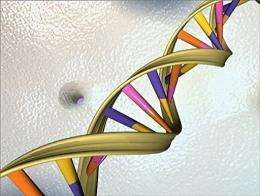Genes drive behaviour, but culture can select genes: study

Culture, not just genes, can drive evolutionary outcomes, according to a study released Wednesday that compares individualist and group-oriented societies across the globe.
Bridging a rarely-crossed border between natural and social sciences, the study looks at the interplay across 29 countries of two sets of data, one genetic and the other cultural.
The researchers found that most people in countries widely described as collectivist have a specific mutation within a gene regulating the transport of serotonin, a neurochemical known to profoundly affect mood.
In China and other east Asian nations, for example, up to 80 percent of the population carry this so-called "short" allele, or variant, of a stretch of DNA known as 5-HTTLPR.
Earlier research has shown the S allele to be strongly linked with a range of negative emotions, including anxiety and depression.
Critically, it is also associated with the impulse to stay out of harm's way.
By contrast, in countries of European origin that prize self-expression and the pursuit of individual over group goals, the long or "L" allele dominates, with only 40 percent of people carrying the "S" variant.
The study, published in Britain's Proceedings of the Royal Society B: Biological Sciences, offers a novel explanation as to how this divergence might have come about.
Setting aside discredited ideas linking genetics and race, the researchers suggest that culture and genes may have interacted over time to shape the process of natural selection, helping individuals -- and the societies in which they lived -- to survive and thrive.
Ancient cultures in Asia, Africa and Latin America highly exposed to deadly pathogens, they conjecture, may have tended toward collectivist norms in order to better combat disease.
That social transformation, in turn, could have favoured the gradual dominance of the risk-avoidance S allele.
"We demonstrate that evolution is operating at least two levels," said Joan Chiao, a professor at Northwestern University in Chicago and lead author of the study.
"One is biological, which is well understood. But there is also a level where cultural traits may have been selected for themselves, emerging in congruence with the selection of different types of genes," she explained by phone.
One well known example of so-called "culture-gene co-evolutionary theory" has to do with drinking cow's milk, something humans are not intrinsically adapted to do.
Over time, milk consumption led to both the genetic selection of protein genes in cattle, and a gene in humans that encodes lactase, an enzyme that can break down the otherwise indigestible lactose in dairy.
In the case of collective cultures and the S allele, "we don't make a strong claim on the chicken-or-egg problem" of which came first, said Chiao.
"What we are proposing is that cultural and genetic selection actually operate in tandem, and that you can view human behaviour as a product of culture-gene co-evolution," she said.
The study also argues that collectivist cultures may help protect against the genetic risk of depression that comes with having the S allele.
"Such support seems to buffer vulnerable individuals from the environmental risks or stressors that serve as triggers to depressive episodes," said Chiao. The fact that the United States and Europe have higher rates of anxiety and mood disorders despite having the L allele may come from the stress of living in highly individualistic cultures, she suggested.
"People have treated natural selection as a rationale for looking for universal traits, across populations and species."
"But what really matters is the diversity across populations and species which may help us better understand how natural selection has operated at both individual levels and ecosystem levels," she said.
Related story: 'Culture of we' buffers genetic tendency to depression
(c) 2009 AFP

















